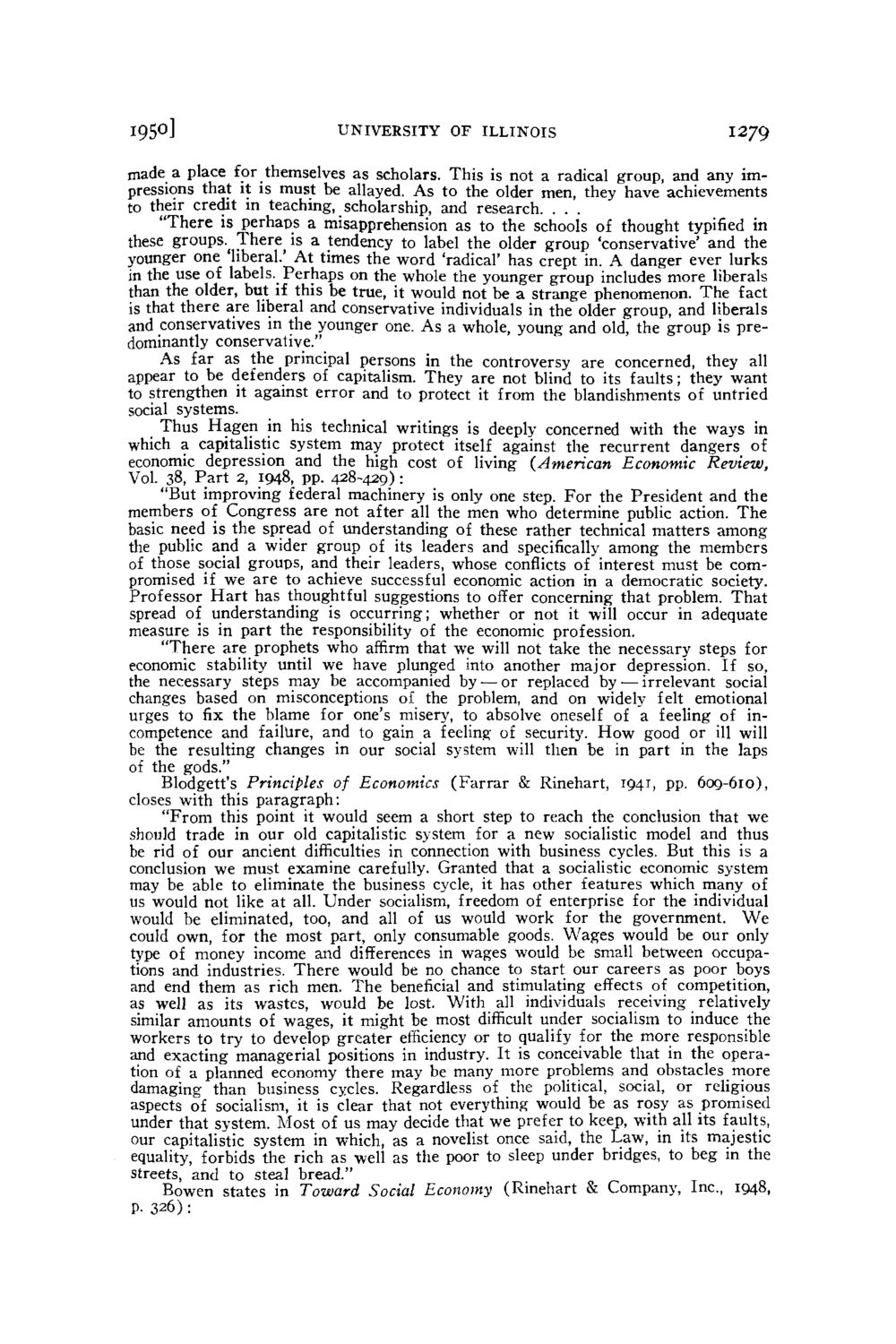| |
| |
Caption: Board of Trustees Minutes - 1950
This is a reduced-resolution page image for fast online browsing.

EXTRACTED TEXT FROM PAGE:
i95«] UNIVERSITY OF ILLINOIS 1279 made a place for themselves as scholars. This is not a radical group, and any impressions that it is must be allayed. As to the older men, they have achievements to their credit in teaching, scholarship, and research. . . . "There is perhaps a misapprehension as to the schools of thought typified in these groups.^ There is a tendency to label the older group 'conservative' and the younger one 'liberal.' At times the word 'radical' has crept in. A danger ever lurks in the use of labels. Perhaps on the whole the younger group includes more liberals than the older, but if this be true, it would not be a strange phenomenon. The fact is that there are liberal and conservative individuals in the older group, and liberals and conservatives in the younger one. As a whole, young and old, the group is predominantly conservative." As far as the principal persons in the controversy are concerned, they all appear to be defenders of capitalism. They are not blind to its faults; they want to strengthen it against error and to protect it from the blandishments of untried social systems. Thus Hagen in his technical writings is deeply concerned with the ways in which a capitalistic system may protect itself against the recurrent dangers of economic depression and the high cost of living {American Economic Review, Vol. 38, Part 2, 1048, pp. 428-429) : "But improving federal machinery is only one step. For the President and the members of Congress are not after all the men who determine public action. The basic need is the spread of understanding of these rather technical matters among the public and a wider group of its leaders and specifically among the members of those social groups, and their leaders, whose conflicts of interest must be compromised if we are to achieve successful economic action in a democratic society. Professor H a r t has thoughtful suggestions to offer concerning that problem. That spread of understanding is occurring; whether or not it will occur in adequate measure is in part the responsibility of the economic profession. "There are prophets who affirm that we will not take the necessary steps for economic stability until we have plunged into another major depression. If so, the necessary steps may be accompanied by — or replaced by •— irrelevant social changes based on misconceptions of the problem, and on widely felt emotional urges to fix the blame for one's misery, to absolve oneself of a feeling of incompetence and failure, and to gain a feeling of security. How good or ill will be the resulting changes in our social system will then be in part in the laps of the gods." Blodgett's Principles of Economics (Farrar & Rinehart, 1941, pp. 609-610), closes with this paragraph: "From this point it would seem a short step to reach the conclusion that we should trade in our old capitalistic system for a new socialistic model and thus be rid of our ancient difficulties in connection with business cycles. But this is a conclusion we must examine carefully. Granted that a socialistic economic system may be able to eliminate the business cycle, it has other features which many of us would not like at all. Under socialism, freedom of enterprise for the individual would be eliminated, too, and all of us would work for the government. W e could own, for the most part, only consumable goods. Wages would be our only type of money income and differences in wages would be small between occupations and industries. There would be no chance to start our careers as poor boys and end them as rich men. The beneficial and stimulating effects of competition, as well as its wastes, would be lost. With all individuals receiving relatively similar amounts of wages, it might be most difficult under socialism to induce the workers to try to develop greater efficiency or to qualify for the more responsible and exacting managerial positions in industry. It is conceivable that in the operation of a planned economy there may be many more problems and obstacles more damaging than business cycles. Regardless of the political, social, or religious aspects of socialism, it is clear that not everything would be as rosy as promised under that system. Most of us may decide that we prefer to keep, with all its faults, our capitalistic system in which, as a novelist once said, the Law, in its majestic equality, forbids the rich as well as the poor to sleep under bridges, to beg in the streets, and to steal bread." Bowen states in Toward Social Economy (Rinehart & Company, Inc., 1948, P- 326) :
| |